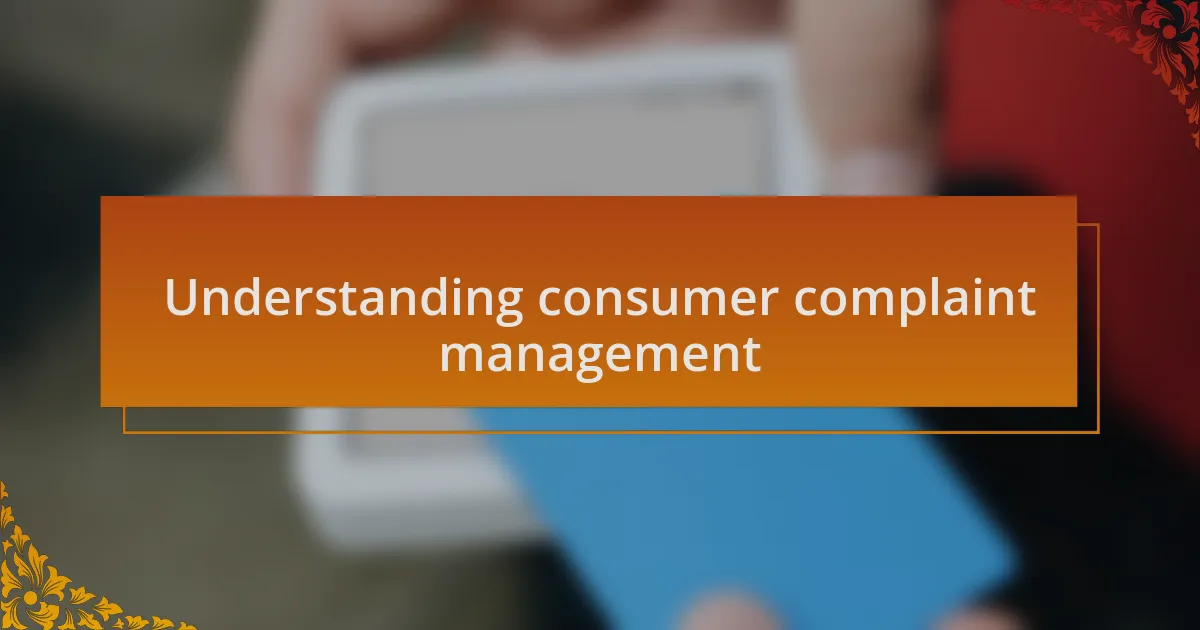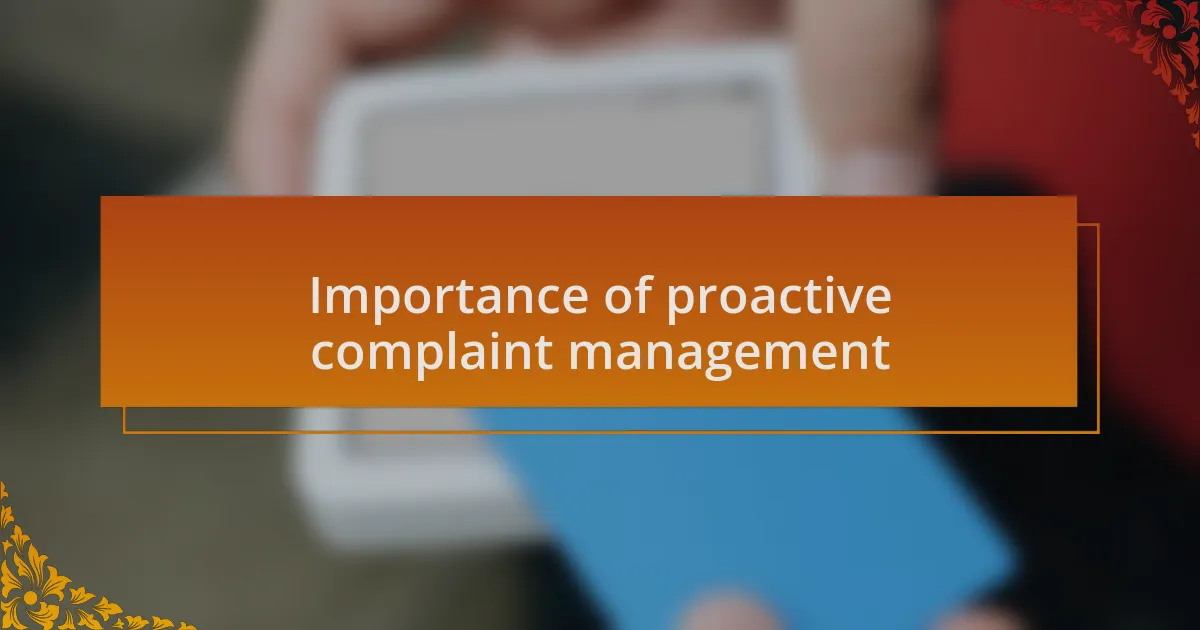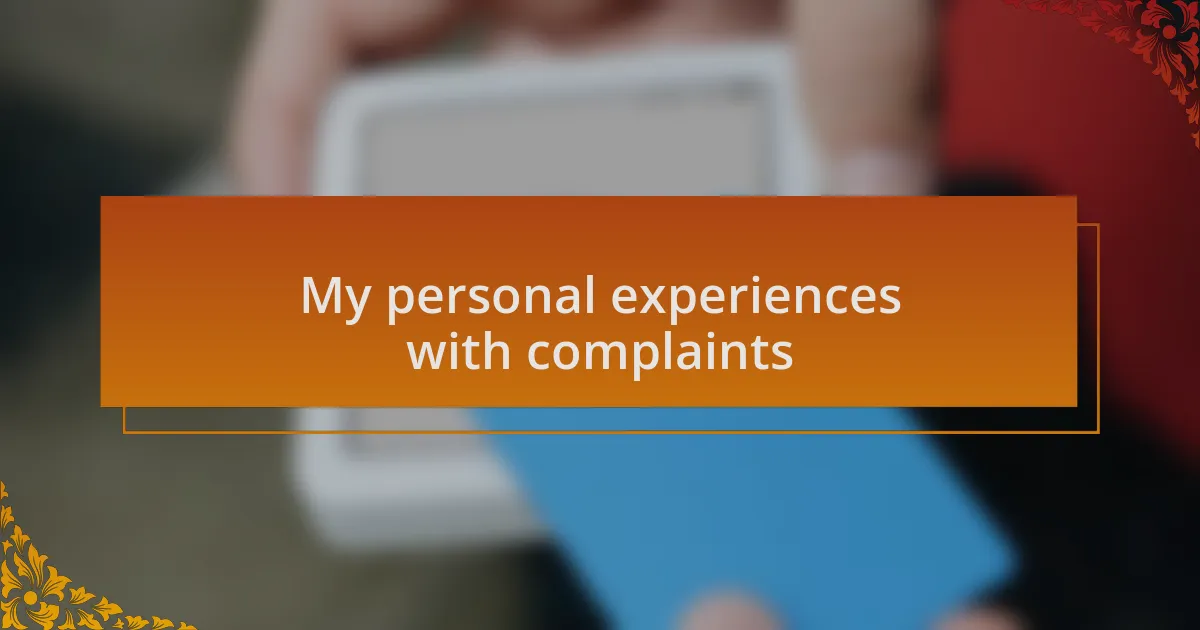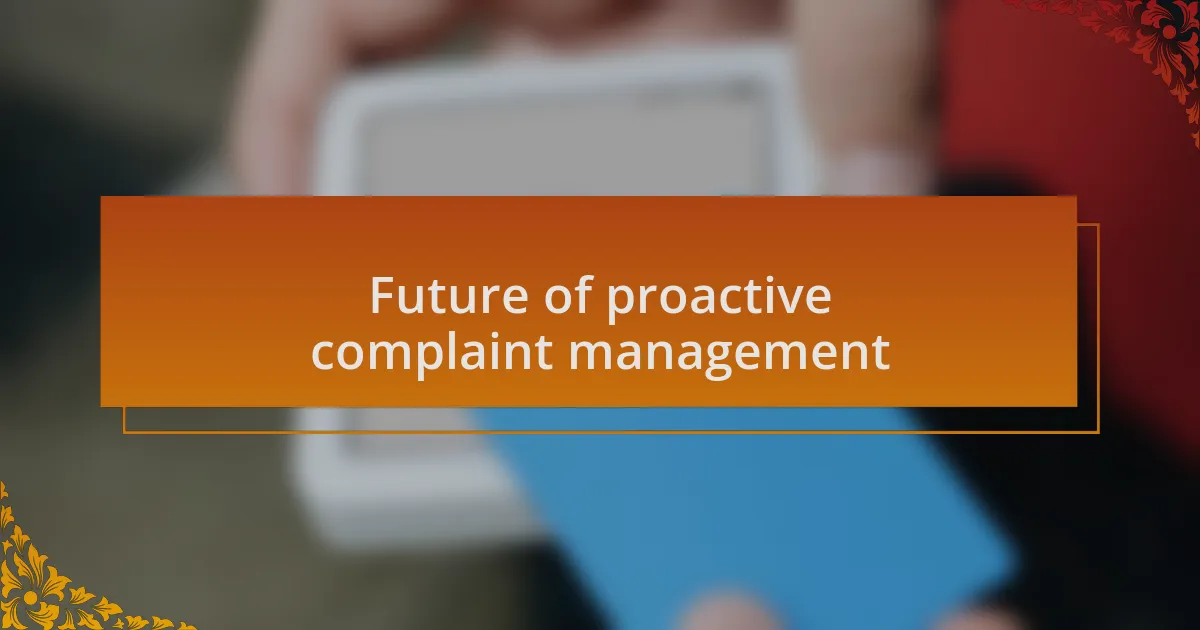Key takeaways:
- Effective consumer complaint management relies on active listening, empathy, and viewing complaints as opportunities for improvement.
- Proactive complaint management fosters customer loyalty by addressing issues before they escalate and creating a sense of partnership between the consumer and the brand.
- Key strategies include implementing a systematic feedback loop, empowering staff to resolve issues on the spot, and leveraging technology for transparency and communication.
- Timely resolution of complaints enhances customer satisfaction, builds loyalty, and positively impacts a brand’s reputation.

Understanding consumer complaint management
Consumer complaint management is all about how businesses respond to and handle complaints from their customers. I remember a time when I faced a frustrating issue with a product; I reached out to customer service expecting indifference, but instead, they were genuinely eager to resolve my concern. This experience underscored for me the importance of active listening and empathy in complaint management.
When I think about what effective consumer complaint management entails, I can’t help but consider the emotional journey of a dissatisfied customer. Have you ever felt unheard when raising an issue? It can be disheartening. Companies that view complaints not as nuisances but as opportunities for improvement can foster loyalty. By addressing complaints proactively, they demonstrate a commitment to their customers’ satisfaction and well-being.
Moreover, understanding the nuances of complaint management can drive product and service improvement. When companies take feedback seriously, they can identify underlying problems that may not be evident otherwise. I once participated in a focus group for a service that transformed my opinion about the brand simply because they valued my input. This underscores the idea that effective complaint management is not just about resolving an issue; it’s about building a culture of transparency and trust.

Importance of proactive complaint management
The importance of proactive complaint management cannot be overstated. When businesses anticipate and address customer issues before they escalate, they not only prevent dissatisfaction but also signal that they genuinely care. I recall a local coffee shop that would often ask for feedback as I finished my drink, which made me feel valued. That simple act helped them catch potential complaints early on and tailor their offerings effectively.
Taking a proactive approach transforms complaints into valuable dialogue. Have you ever wished a company would reach out to you before problems arose? I’ve had experiences where businesses followed up after a purchase, asking how I felt about the product. This shows that they’re not just waiting for complaints; they’re actively seeking ways to improve. It creates a sense of partnership between the consumer and the brand, fostering loyalty and trust.
Moreover, effective complaint management leads to continuous improvement. Businesses that learn from feedback can innovate and adapt to meet their customers’ evolving needs. I once encountered a startup that regularly adjusted its features based on user experiences, making me feel like my opinions truly mattered. This fluidity in response not only enhanced my experience but also reinforced my loyalty to the brand.

Key strategies for effective management
To effectively manage complaints, businesses should implement a systematic feedback loop. I remember when I dined at a restaurant where the manager personally approached patrons for their thoughts on the meal. This not only made me feel important but also provided the restaurant with immediate insights to make real-time adjustments. How often do we as consumers wish our feedback could be listened to in the moment, rather than just filling out a survey days later?
Another key strategy is empowering frontline employees to resolve issues on the spot. In my own experience, I’ve seen how a well-trained staff can turn a potential complaint into a win. I recall a hotel stay where the front desk promptly handled a mix-up with my reservation, ensuring my stay remained enjoyable. When employees are confident in handling complaints, customers feel reassured knowing that their concerns will be addressed swiftly.
Lastly, utilizing technology can enhance proactive complaint management. I once used an app from a telecom company that allowed me to report issues directly and receive immediate updates on resolutions. This transparency made me feel like I was part of the solution rather than a mere passive voice. How reassuring is it to know that companies are leveraging tools to keep us informed throughout the process? The right mix of technology and human touch can significantly boost customer satisfaction.

Benefits of addressing complaints early
Addressing complaints early offers significant advantages, primarily in building customer loyalty. I once had an experience with a retail brand that quickly responded to a product defect I encountered. They not only replaced the item but also sent a handwritten note apologizing for the inconvenience. That gesture transformed my frustration into a deep sense of appreciation for the brand. Isn’t it amazing how swift action can turn a negative situation into a positive connection?
Early intervention also tends to minimize the costs associated with resolving complaints. Reflecting on my time in customer service, I learned that addressing issues before they escalate often saved both time and resources. I recall a situation where a small service error was fixed promptly, preventing it from spiraling into a larger issue that would have required extensive follow-up. How much easier and cost-effective is it for companies to tackle problems when they’re still manageable?
Beyond cost savings, timely resolution can significantly enhance a brand’s reputation. I remember hearing about a local café that quickly corrected an order mistake and offered a complimentary drink. This quick recovery led to word-of-mouth praise, drawing in more customers who appreciated the café’s commitment to service. Isn’t it encouraging to think that just one positive complaint-handling experience can ripple out to create a lasting impression in the community?

My personal experiences with complaints
I’ve dealt with a variety of complaints throughout my life, but a particular experience stands out. Once, when my internet service went down for several days, I reached out to customer support. They not only resolved the issue quickly but also offered me a compensation credit for the downtime. That simple acknowledgment made me feel valued and respected as a customer.
Another notable incident occurred when I ordered a meal that wasn’t what I expected. It wasn’t just about the wrong dish; it was the response that mattered. The restaurant’s manager personally apologized and offered me a free meal on my next visit. Such personalized attention not only made me forget my disappointment but also transformed me into a loyal patron. Doesn’t it feel great when a business takes your concerns to heart?
In contrast, I’ve encountered situations where complaints were ignored. I once had to follow up multiple times for a warranty issue, and it left me feeling frustrated and undervalued. This experience reaffirmed my belief in the importance of proactive complaint management. Companies really miss out when they overlook the opportunity to engage with their customers and turn a negative experience into a positive one. How much better would it be if every customer felt heard and appreciated?

Lessons learned from complaint management
One key lesson I’ve learned from managing complaints is the importance of timely responses. I recall a time when my favorite store sent me a broken item instead of what I ordered. When I reached out, they responded within an hour, apologizing for the mistake and immediately arranged a replacement. That swift action not only alleviated my frustration but also reinforced my trust in them. Isn’t it remarkable how timely communication can turn a potentially negative experience into a positive memory?
Another realization is that personalization goes a long way in complaint management. I remember an incident with a subscription service where my billing went awry. Instead of a generic reply, I received a heartfelt email from a representative who empathized with my situation and shared her own experience with similar issues. This human touch fostered a connection, making it easier to forgive the error. When businesses prioritize empathy, it creates a lasting bond with their customers. What if more companies adopted this approach?
Lastly, I’ve seen firsthand how transparency plays a critical role in complaint resolution. In a situation with a travel booking gone wrong, the airline’s honesty about their backlog during peak travel times gave me peace of mind. They kept me updated throughout the process, which made waiting more bearable. This level of transparency not only keeps customers informed but also builds rapport and loyalty. Wouldn’t it be beneficial for all companies to embrace such honesty in their dealings?

Future of proactive complaint management
The future of proactive complaint management is undoubtedly shaped by technology. I recently noticed how some companies are utilizing AI chatbots to handle initial complaints, allowing for immediate responses 24/7. Isn’t it fascinating how this can streamline the process and free up human representatives for more complex issues? This shift not only enhances efficiency but also shows customers that their concerns are taken seriously from the get-go.
As brands embrace data analytics, we will likely see a trend toward more predictive strategies in complaint management. I recall a scenario where my internet service provider anticipated a service outage in my area and proactively informed customers before they experienced issues. Wouldn’t it be amazing if more companies began to analyze customer behavior to identify potential pain points before they escalate? This proactive approach could significantly improve customer satisfaction and loyalty.
Moreover, I envision collaboration across industries to create unified complaint management standards. For instance, imagine if grocery stores, airlines, and service sectors shared best practices on handling complaints. I once attended a workshop where companies exchanged strategies and stories, which inspired many to rethink their approaches. Wouldn’t it be enriching if businesses actively collaborated to raise the bar for customer service? It could lead to a shift where proactive complaint management is not just a standard but a competitive advantage.